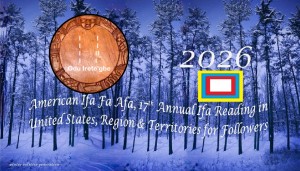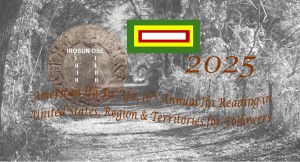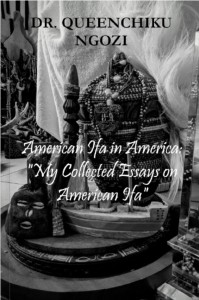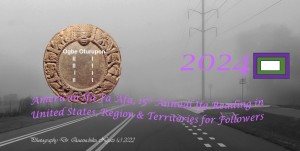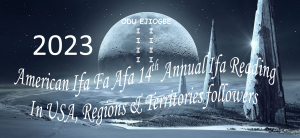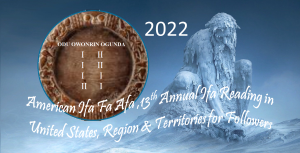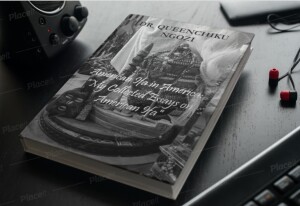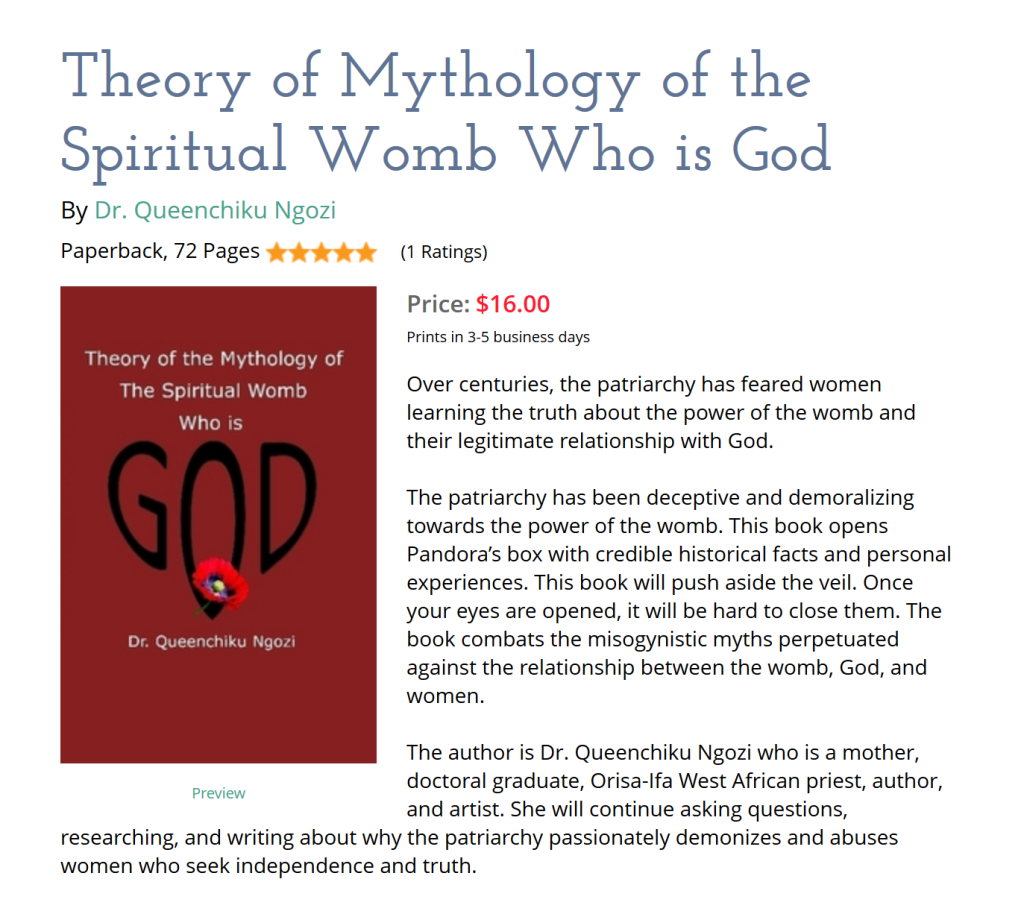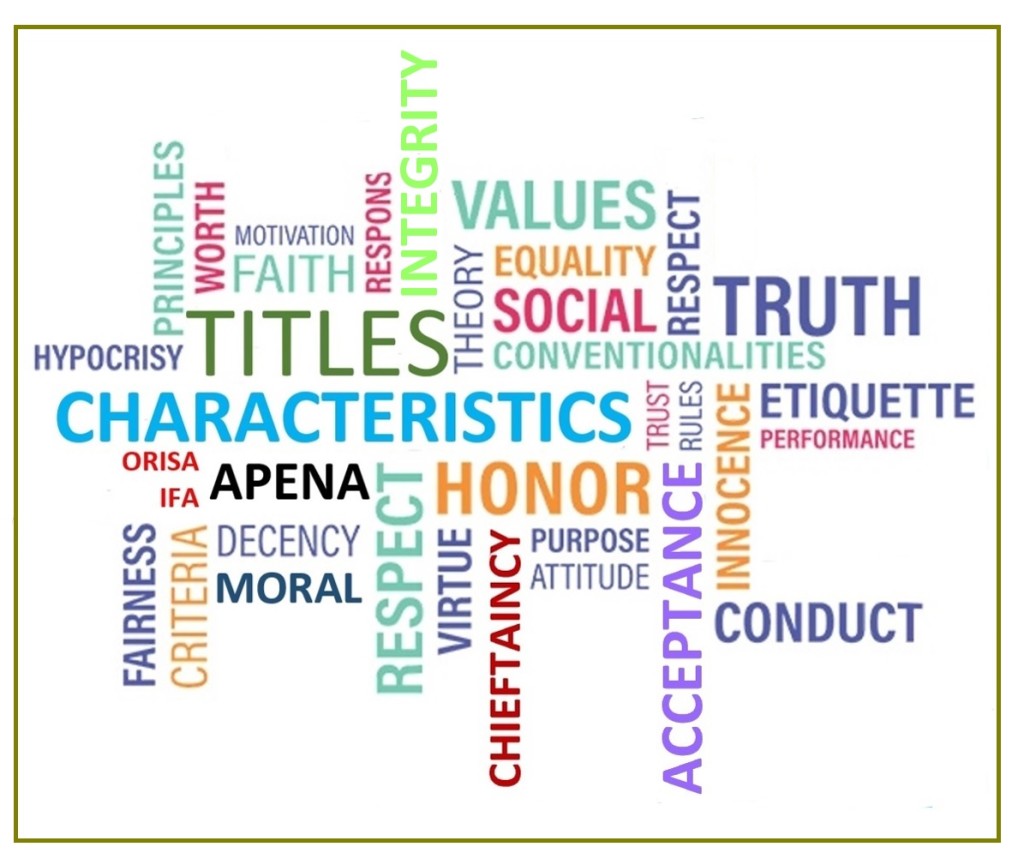American Ifa Fa Afa (501c3) – 17th ANNUAL IFA IN AMERICAN/USA READING FOR 2026 was done Sunday, December 21st, 2025 @ 10:06 am in the State of Florida at Ile Ikoko Ata, for the total United States, regions, and territories followers. (This is for those who follow us — optional)
OVERVIEW THOUGHTS:
The Odu for 2026 reminds me of a song by Billy Holiday ‘God Bless the Child.’ The lyrics go:
“Mama may have, papa may have, but God bless the child that’s got his own. Them that’s got shall get, Them that’s not shall lose, So the bible said, and it still is news. Yes, the strong get smart, while the weak ones fade. Empty pockets don’t ever make the grade; Money, you’ve got lots of friends, they’re crowding around the door.
When you’re gone and spending ends, they don’t come no more…”
Many people are blessed, but they are too busy wishing for and envying others’ property. Many clichés appear in this odu. For instance, a person can’t see the forest because of the trees. We can be our own worst enemies sometimes. Don’t curse the mother’s womb that gave birth to you. If you have a godmother, you have two mothers, and neither should be cursed because Olodumare has their backs. Be a part of the solution and not a part of the problem by adding conspiracy theories to a partial thought or ideology. Another example is telling a child that hitting is wrong. They know it’s wrong, yet they hit someone anyway and then run to their parent to fix what they did. It is clear that this odu warns that Ifa doesn’t want the Awos to be the parent in such a scenario.
Ifa continues to warn us of wars on top of wars. Wars in our home, our ile, our businesses, wars among relatives and siblings. Don’t be the fire starter. We have to watch what we say because people are always looking for a reason to have a war with us. Ifa tells us to be cautious and prepared financially for a recession and a lack of assistance and opportunities. Ifa warns of our health and advises a holistic approach integrated with Western medicine to either cure, heal, or stabilize our health. Over time, Ifa has advised us to grow our own food and take care of our health. Most of all, Ifa advises us to tell the truth and state the facts.
We have to change our strategy and routine to minimize trouble and misery in 2026. Think outside the box and be more creative.
May Olodumare bless us all.
OBI:
Obi by Apetbi Olaifa Ifaseye
Nangare: ejife
Ancestors/eguns: etawa meji with changing daily routine
Esu Baralayiki: ejife ire
Ikins Ifa: ejife
THE ODU:
Holy Odu Irete ‘gbe (alias: Irentegbe irete’untelu, Ate’gbe)
Ire else Ori (Eleri) kote yale
| I | I |
| I | I |
| I | II |
| I | I |
GOVERNING ORISAS 2026:
Leading Orisa: Orisa Osain (other spellings: Osanyin, Ossaim, Ozain)
Accompanying Orisa: Oshun (Osun)
Supporting the Orisas: Iyami (The Mothers), Ajes, Orunmila, Obatala, Ochossi, Oduduwa, Oya, BabaluAye
SAYINGS:
- Have to do ebo for the ebo to keep the ire
- Can’t see the forest for the trees
- Justice and ifa; connection to God
- Don’t curse the Mothers (your mother, godmother, or The Mothers)
- Elevated the ancestors
- Scarcity
- Rituals for protection and stability
- Don’t ignore Orunmila
- Everything you do is under spiritual control
- The ebo is from ogbe
MAFEREFUN: Iyami (The Mothers), Orunmila, Obatala, Ochossi
CLOSING ODU:
Holy Odu Osa’di (odi)
The war between the fish and the hook
Offering to Oya
KEYWORDS:
Ancestors, commissioned eguns, the importance of community, human needs, working together, conflict vs. harmony and peace, rewards and losses, smart vs. stupid, overcoming obstacles through spirituality, embarrassment, traps and betrayal, keeping secrets to self, suffering from stomach problems, and memory loss.
BIRTH IN THIS ODU:
- New broom
- Ebo for the ebo
- Hernia disk, spine, deformation of the vertebral column
- New relationships
- New businesses
- Lack of resources/ scarcity
FLAG:
The colors are white (middle), red, yellow, and blue (outer band)
NOTE (Optional):
- ONLY use palm oil for the witches again this year and give peanut oil for the Orisas and Ikins.
- NO honey directly on ikins – put the honey in a plate or a glass beside Ifa.
RECEIVED (Optional):
- Warriors (Esu, Ochossi, Ogun, Osun)
- Kofa or Awofaka (hand of Ifa: 16 ikins for both men and women with 4 eyes)
- Elekees ceremony
- Received Olokun
- Received the ancestors’ staff
EWE:
- Lemon Grass
- Cundiamor
- Plum
- Purslane
- Aberikunlo
- Guama
EBO (optional):
- 1 rooster to Esu
- 1 white rooster to Ochossi and Obatala together
- New broom
- Offerings to Oya
- Offerings to the Iyami
- Follow the Awo instructions for justice
- Offerings to Obatala
- A little honey and water daily to sweeten the tongue (don’t drink)
HEALTH:
- Blood pressure
- Respiratory system, hepatic cirrhosis, or throat problems
- Hemorrhoids and constipation
- prostate cancer
- pneumonia
- acid reflux
- Men have to be more careful of blood clots in legs
- depression
- mental illness
- stomach and liver problems from eating bad and/or spicy foods
PAY ATTENTION
- Be careful of the virus
- Lack of resources
- Investment cons
- Contagious bacteria and diseases
- Fault advice and suggestions
- Impulsive decisions
- Health and financial stability
PROHIBITION (Optional):
- Don’t do evil against anyone
- Don’t be unconsidered
- Don’t eat coconut
- Don’t eat greasy foods
- Don’t smoke and don’t blow smoke on Ifa
- Don’t sugar cane
- Don’t drink alcohol, palm wine, or tainted alcohol beverages
- Don’t eat yellow rice and be cautious of rice bugs – bad for the liver/ eat brown rice
- Don’t do wrong and ask the Ifa Awo to make your wrong right
- Don’t kill ants
- Don’t eat raw food
- Don’t go into the ocean because bacteria and viruses
- Don’t eat spicy or salty food
- Don’t do favors (be selective) because no one will ever appreciate you
- Don’t eat a heavy meal after 6pm
DESCRIPTION
- Avoid theft and be honest
- Wars on top of wars and army destruction
- Be careful of skin contagious diseases like measles, chicken pox, smallpox, monkeypox etc.
- Be careful of colds and fevers
- Be careful of rape and violence
- Be careful of infidelity
- Garbage in, garbage out
- Note: intuition is not creativity
- Be careful of multi-level market schemes (e.g. network marketing, pyramid schemes)
- Be careful of get rich quick investment ideas
- If you feel bad, go to the doctor
- Obey your taboos
- Danger of recklessness
- Lack of consideration for others
- Be grateful
- Emphasis on the importance of moderation
- Symbolic symbol that can lead to financial difficulties
- Save money for a hard time
- Seek creative, legal solutions to overcome a lack of resources ex: hobbies into legal businesses
- Be frugal
- Spend money wisely so you don’t fall into financial debt
- Be careful of accidents (home and highways)
- Pick a good godparent who will work with you when you don’t have
- Get a gastrointestinal check
- Leaders use their ori; pray ori will guide you to higher grounds
- Do a ritual for sweet attraction
- Society of men will try to degrade women’s position and power with embarrassment
- Deal with your spirituality to solve financial debt
- Protect your head by keeping it covered
- Substance abuse
PALO MAYUMBE (optional):
OBI: Etawa (akita obita)
Done by: Tata Ntangu and Yeye Wolomabaku
Zarabando (Zarabanda) and Mama Chola
(shells 4-6, [irosun obara] Ire ariku Oyale – blessings longevity in health & life)
- No one knows what is at the bottom of the sea….
- a lot of uncertainty
- power, light, and money
- Don’t curse the one who gave you birth
- Don’t turn your back on those who gave you a life jacket
- Osogbo and destruction due to ego, vices, and impulsive decisions
- You can have opportunities as well as downfalls
- Stay away from the sea because of the viruses and diseases in the sea
- Stay calm to avoid violence or losing your head
- Protect your head – look up to always see what is over your head
- Be careful of going to jail and/or to the hospital
- Have a good plan and a good strategy when creating a new business
- Be careful of financial mismanagement
- Spiritual obedience is important
- Be careful of toxic substances, alcohol, etc.
- Go to the doctor when having stomach aches and illnesses
- Be careful of fires (candles, electricity, kitchens)
- Give an offering to Zarabando and Mama Chola for stability (candles, fruit, addimus)
- Here, Zarabando and Mama Chola agree that there will be great wealth doing the right ebos and offerings
- You have to create your financial growth and not wait for handouts
- Honor your ancestors and respect elders
- Don’t be selfish
- Save money for a hard time
PRESENT AND WITNESSES:
Oloye Iyaláwo Dr. Queenchiku Ngozi (Ayaba OchaBi Fabuluje-Faseye)
Apetibi Olaifa Faseye
Awotunde Ifaseye
Apetibi AjeOyin Ifaseye
Awo Olayinka Ifaseye
Apetibi Ifakeye Ifaseye
God, Olofi, Olodumare
Orunmila & Ela
Ogbogbo Ancestors
Ogbogbo Babas & Iyanifas Isese lineage
Orisa Odu & IyaNla
Ogbogbo Orisas
Iyamiis
Ase
